Death At My
Doorstep
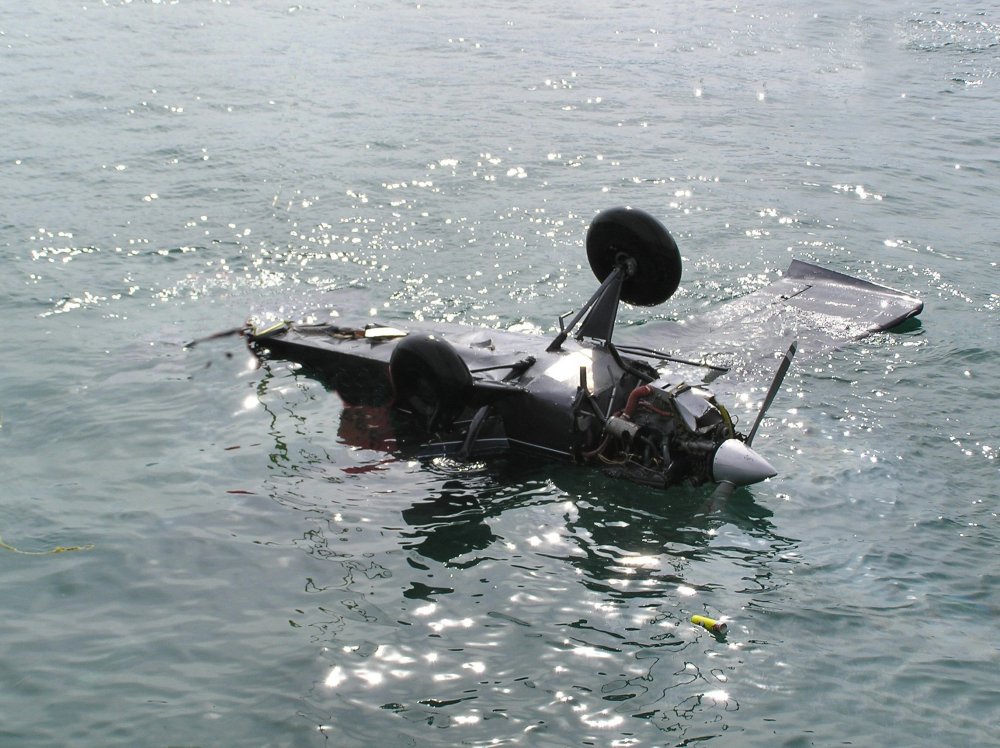
I
didn't actually see the airplane crash, although if I'd
looked out the window at that fatal moment I would have. I
didn't even hear it, though it was less than a half mile
from me. I was inside my RV when it happened, parked on an
empty stretch of beach, suiting up for an after-lunch hike
along the eastern shore of Resurrection Bay. I strapped on
my belt pouches - digital camera, binoculars, bear spray,
hunting knife - the basics without which I don't even go for
a stroll in these parts. I also slung a bota-full of
drinking water over my shoulder and grabbed my hiking stick
on the way out the door.
I had
already selected a point of land a short distance away to
aim for, hoping to find a trail through the forest from
there that would skirt the cliffs further along the
shoreline. I set out at an easy pace in that direction,
walking along the water's edge, enjoying the solitary
tranquility and the promise of a pleasant afternoon in the
woods. It was a warm day, bright but hazy. The north
wind had been blowing since the day before, carrying smoke
down from the Interior wildfires again, Alaska having
endured a record-breaking fire season this year.
There
were more boats than usual on the bay, this being Sunday,
but what I noticed first was a small airplane circling low
and, it seemed to me, steering erratically along my intended
route. I supposed it was a student or novice pilot
practicing turns. The first indication that something was
amiss occurred a moment later when I spotted several people
a few hundred meters down the beach ahead of me, the only
others out here. They ran to the water's edge and began
waving their arms frantically over their heads, a gesture
often used as a distress signal. Then they pointed in an
exaggerated way to their left. I pulled out my binoculars to
see better. They seemed to be directing this pantomime at a
small motorboat close off the stony beach. It must have
worked because a moment later the boat throttled up and sped
down the shoreline beyond the waving group.
I
walked on a bit farther, then stopped and raised my
binoculars again to see what the small boat was up to. As I
watched, he zoomed in close to the rocky shore ahead, almost
exactly where I had been heading myself. I could just make
out what looked at first like a pointed rock poking up out
of the water. Then I decided it looked manmade, like part of
a small, sunken boat. Then I realized somebody was clinging
to whatever was poking up. The motorboat pulled in close and
someone threw a life preserver to the person on the floating
object. I walked on quickly then until I reached the people
I'd seen waving on the beach and, after the briefest
greeting, I asked them if they knew what was going on.
That's when I learned that a small airplane had just crashed
into the water over there.
These
folks, two couples and a teenager, had been picnicking on
the beach when they saw this plane glide down low along the
near slope as if it were going to land, or maybe do a
"touch & go" on a gravel bar that stretched
out where the beach intersected the forested shoreline.
Instead, the plane, which had landing wheels, not pontoons,
came down onto the water a hundred yards short of the bar.
Almost instantly its nose stabbed into the sea and the plane
pitch-poled onto it's back. It sank quickly, they said,
leaving only a bit of the tail sticking above the surface of
the cold water.
|
These
folks immediately dialed 911 on their cell phone.
I found out later the small boat over by the wreck
belonged to an off-duty state trooper who just
happened to be nearby and responded to a police
radio broadcast relaying the 911 report. Soon more
official vessels began arriving. First a bright
orange Coast Guard inflatable, then a Police
Patrol boat and an Alaska State Trooper speedboat.
|
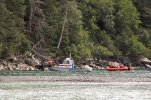 |
It
turned out where I joined the picnickers was about as close
as we could get to the crash site on foot. A small but
swift-running and icy-cold stream, which I had not seen from
my RV when I'd set out to hike along this shore, empties
into the bay just past there, effectively blocking the way.
Beyond the stream were some gravel bars, and then the
shoreline cut south at the base of a steep, thickly wooded
slope. That's where the downed plane was lying.
We
watched the rescue vessels through binoculars, helpless
ourselves to do more. Soon police and fire department
vehicles came speeding out onto the beach, followed by an
ambulance and assorted cars and pickup trucks. They parked
haphazardly around us. A local reporter showed up.
I
gleaned more information by eavesdropping on the handheld
radio conversations between the rescue personnel around me
and those on the boats over by the plane. The one fellow I'd
seen crouched on the plane's floating tail earlier was now
safely aboard one of the boats, but there were still two
people inside the inverted, submerged cockpit of the
airplane. If that were the case, they'd been down there for
about twenty minutes already.
The
boat crews were calling urgently for divers, somebody with a
tank. I saw a man go into the water from the Coast Guard
inflatable. He seemed to be dressed in a bulky survival
suit, not a diver's wet suit, and although he appeared to
wear a mask and fins he wasn't wearing scuba tanks. Still,
he must have managed to get a look at the trapped victims.
Over the radios I now heard them calling for cutters, divers
with tools to get at and free the unconscious passengers
still trapped in the cockpit.
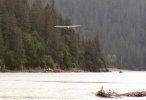 |
As
I talked more with the witnesses I learned that
the other small plane I had seen circling around
earlier had apparently been flying in tandem with
the downed plane. They said it had been following
close behind when the crash occurred. Now that
airplane returned, circling low over the crash
scene and buzzing the beach where we stood.
|
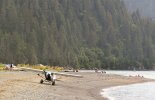 |
Then
he came around again and, to my great surprise,
landed smoothly on the rough, rocky, sloping
beach, just 100 yards from us. In Alaska one out
of six people can pilot an airplane. Even so, I
heard one woman nearby say, "Boy, I'd fly
with that guy anytime." It was a
difficult landing executed perfectly.
|
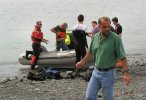 |
I
could tell by the way the two men came running
towards us from the landed plane that they were
upset. One of them in particular looked like he
was about to start crying as he desperately sought
updated information from the rescue workers
milling around.
|
Just
then someone said, "They've got one out and they're
bringing him over." As we watched, the orange Coast
Guard inflatable came zooming towards us from the plane
wreck and beached just yards from where I stood. I heard
someone call out, "We've got a pulse" as rescue
personnel rushed forward and lifted the victim, who we could
now see was a heavyset woman, out of the inflatable boat and
onto a stretcher. The woman was unconscious and frothing at
the mouth. They were administering CPR, as they had been in
the boat, trying desperately to get her breathing again.
Then they whisked her across the beach to the waiting
ambulance.
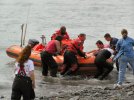
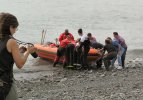
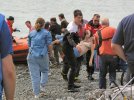
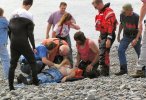
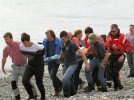
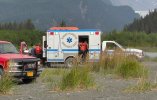
A
minute later the ambulance tore away, throwing gravel and
dust as it went. I heard someone say over a radio,
"We've lost her pulse," and then I heard no more.
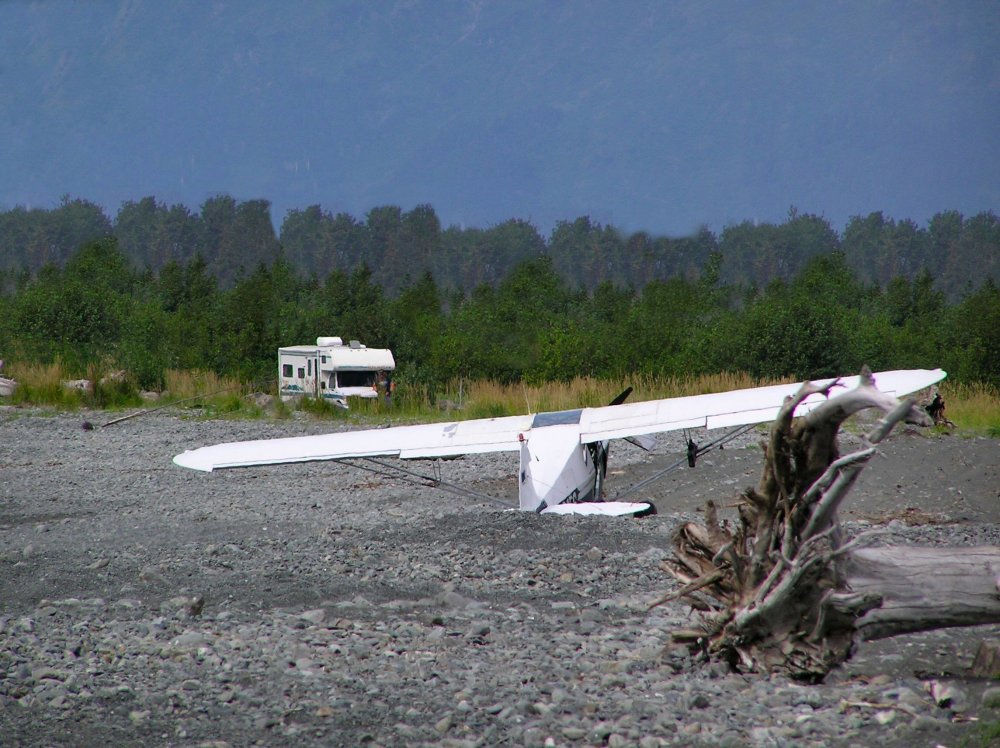
I
wasn't there when they brought in the second victim, a man
who had been trapped in the plane's cockpit underwater for
at least 40 minutes at that point. I had walked back to my
RV to see whether they needed me to move it. All of the
emergency vehicles were coming and going by way of a narrow
passage through the gravel turnaround in which I was parked,
passing just a few feet from my camper. It turned out I was
OK; the RV wasn't in the way. By the time I returned to the
rescue scene the last victim had been taken away. Someone
said there had been an air pocket in the cockpit and that's
why the first woman they'd pulled out wasn't already dead,
if indeed she wasn't. Maybe the man could be revived, but in
these waters hypothermia might have killed them both in the
amount of time they were submerged.
One of
the eyewitnesses to the crash was a small, wiry man with
what I call a "cracker" accent. We chatted while
we stood around on the beach watching the rescue efforts.
Sure enough, he told me he was originally from Florida. He
had moved up to Alaska 27 years ago and never left. He was
here in Seward for the summer working for a construction
outfit, quarrying rock from a rugged-looking glacial gorge
that flanked the beach. He went on to say there were a
couple of big black bears and at least one grizzly up in
there right now, maybe a mile from where my RV sat. They'd
been bothering the workmen camped in their trailers on the
worksite. Most of the men had moved to a campground closer
to town. "Anyway," he warned me, "keep your
eyes open if yer gonna' do any hikin'. Them bears've been
sniffin' at our doors up there. They seem a might
inquisitive." I thanked him and made a mental note to
bring my shotgun with me next time I go into the woods
around Resurrection Bay. Not that a wild bear would be
likely to attack me even if we did cross paths, as long as I
didn't have food with me or surprise a mother with cubs.
Still, 'tis better to err on the side of caution. Besides,
it's so macho. I never got to carry a gun in Rhode Island.
|
The
rest of the afternoon was anticlimactic, but
interesting nonetheless. Once the victims were
taken away, the scene on the beach cleared up and
I soon found myself all alone there, as if nothing
had happened. Except I could now see a tow boat
slowly pulling the still-submerged airplane
towards the nearby shipyard around the point, so I
hiked over to watch them haul it out of the water.
|
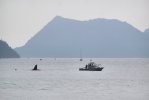 |
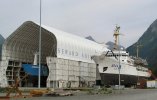

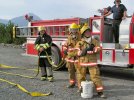
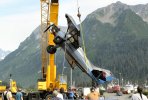

Epilogue
to Disaster
When I
finished writing this account the next afternoon, I took a
break and took out the garbage. This entailed hiking almost
a mile to a dumpster beyond the shipyard where they'd hauled
out the wrecked plane the day before.
|
On
the way back I spotted the plane lashed to a
trailer, broken and forlorn. Beside it was a crew
from ABC Alaska News out of Anchorage. Curious, I
approached and discovered they were interviewing
the Air Safety Investigator from the National
Transportation Safety Board about the crash.
|
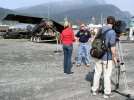 |
I
stuck around and, when they were done, got to ask the
investigator a few questions myself. Sadly, I learned that
both of the passengers trapped in the plane had died. Sadder
still were their relationships to the living. The woman I'd
seen brought ashore was the wife of the pilot, the man who
had been taken from the floating tail section and survived.
The other passenger killed was the father of one of the men
who landed on the beach in the second plane. They had all
been out for a Sunday fly together, in two planes. Everyone
was family and good friends. How terribly sad for the
survivors.
I
learned, too, why the plane crashed. The investigator said
the airplane, a Maule 5, had developed an oil leak.
Realizing this, the pilot was attempting to make it back to
the Seward airport when the engine died. The plane lost
altitude quickly. The pilot tried to glide onto the gravel
bar across the stream from the beach so that he could at
least put down on solid land, but the airplane lacked
sufficient momentum. It was only 100 yards shy of the bar
when it hit the water.
The
investigator, a pleasant ex-helicopter pilot named Clint
Johnson, inquired about what I'd seen. When I mentioned I'd
taken photos of everything that followed the crash, he asked
if he could have copies of them. He wound up driving me back
to my RV and I burned a full set of my plane crash jpegs
onto a CD for him, quite a few more photos than I have
posted on this page. As he was leaving, the ABC Alaska news
reporter, Annie Roach, pulled up with her cameraman and
asked if they could film an interview with me for the Ten
O'clock News. Having no pressing engagements at the moment,
I agreed. She promised to send me a copy of the filmed
interview, in which I summarized my version of yesterday's
events for the camera.
Looking
back at what happened, I'd say the local rescue people - the
Coast Guard, the fire department, the police and state
troopers, and especially all those capable civilian
volunteers that showed up so quickly when it really mattered
- were outstanding. Fast and efficient, they all seemed
well-trained to handle this sort of thing. Nobody yelled or
became agitated. They just got on with what had to be done
and did it about as well as conditions allowed. Even though
they ultimately weren't able to save the lives of the two
passengers inside the plane's cockpit, all those people
deserve lots of credit. I'd like to have them on my
side if I were in trouble. For my part, I did the only thing
I was fit to do in this circumstance, which was to stay out
of everybody's way.
Seeing
something like this up close makes a person stop and think.
Anybody can die at any moment. I could. You could. Doesn't
matter how old or young you are. You get up in the morning
and go to work or run an errand or do something with some
friends, and WHAM. It's over, instantly. All of it.
Everything. You don't go home that night. You don't get on
with your life the next day. Whatever you left undone will
stay that way forever. You wouldn't expect it any more than
those people in the airplane did.
All
the more reason, I say, to get out and do whatever you
consider most worthwhile, whether it's flying an airplane,
taking a trip, spending time with your kids, helping other
people, weeding your garden or, in my case, simply being in,
with and surrounded by nature. Now's the time to do it. Really.
Here
are some photos from a hike I took a few days ago on Mount
Marathon, overlooking Seward, Resurrection Bay and the
Chugach Mountains. Click each one to enlarge it:

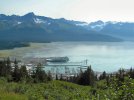
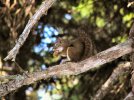
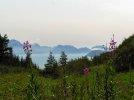
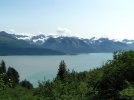
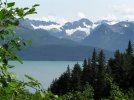

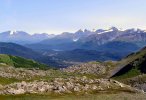
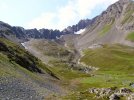




And here
are some shots around the town of Seward, one of my favorites
in Alaska.

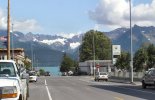
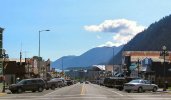
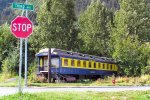

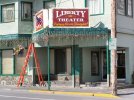

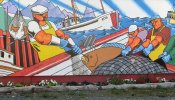
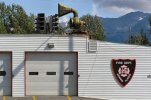
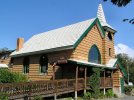
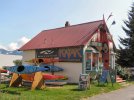
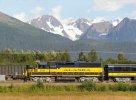


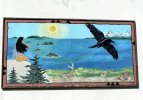


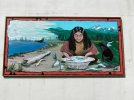
Here is
where I'm parked as I write this. Click on some of these
photos. Is this an awesome place or what?

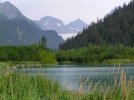
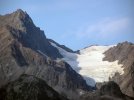
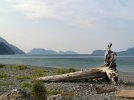

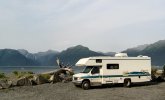

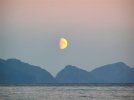

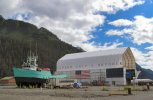
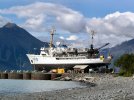
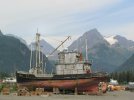

Next Entry: 09/03/04